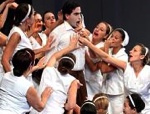A national “first” on stage and in the audience! Awaiting the election of “Miss France 2010,” which will take place at the Palais Nikaïa on Saturday, December 5, the thirty-seven candidates graced several boxes of the Nice Opera House with their slender silhouettes for the premiere of Gioacchino Rossini’s “Il Viaggio a Reims” on Friday, November 27. This particularly successful production also involved fifteen opera houses from across France.
This work by the Italian composer, created to celebrate the coronation of King Charles X at Reims Cathedral in May 1825, does so in the pure spirit of European cosmopolitanism of the time. It was performed for the first time a month later at the Théâtre-Italien in Paris. The risk was that it might appear as a glorifying composition of a regime that history does not particularly praise. Yet the dynamic, spirited, and irony-infused direction by Piedmontese Nicola Berloffa introduces a welcome distance from the risks of a pompous and static piece whose plot unfolds in a confined setting. Ingeniously, the set by Guia Buzzi manages to bring life to an otherwise sparse stage: transformed into the lobby of a modern hotel, with entrances and exits, elevators opening and closing, singers coming and going, all punctuated by eccentric bellhop couples (Jéremy Briffa and Julien Royer), contribute to this pleasant continuity of scenic movement, happily making one forget the brief recitatives. Except for the eternally comedic one by Romain Pascal (Zefrino and Gelsomino).
Moreover, the large number of lyrical artists – the libretto requires sixteen characters! – needed to be vocally harmonious among themselves and musically with the orchestra to prevent the collapse of Rossini’s edifice. This provides an extra reason to commend the Opera’s management for the choice of this cast. Undeniably, the theatrical talents, a compelling necessity with Rossini, sometimes prevail over the vocal performances of this outstanding troupe of actors. The high notes of soprano Elena Gorshunova (the Countess de Folleville) sound, for example, more beautifully than those of Gabrielle Philiponnet (Corinna), who falls a bit short in the grand final aria in honor of Charles X. The exceptionally beautiful voice of Yun Jung Choi (Madame Cortese) also becomes too unstable in the high notes. Mezzo-soprano Jose Maria Lo Monaco (the Marchesa Melibea) moves with her romantic duet with the Count of Libenskof. Tenors Dominique Moralez (Chevalier Belfiore) and Alexey Kudrya (Count of Libenskof) largely dominate the male roles, though the baritone voice of Marco di Sapia (Don Profondo) is charming, notably when listing the guests with the foreign accents adopted by an Italian. Bass Shadi Torbey (Lord Sydney) provides a vocal register that matches his portrayal of a romantic lover rebuffed, yet remaining a very faithful subject of His Majesty.
However, the great success of this production lies in the very “Rossinian,” energetic, lively, and precise direction by Spanish conductor Roberto Fores-Veses at the helm of the Cannes Regional Orchestra. A direction that delighted several of the “Miss France” candidates, for whom this was, with few exceptions, their first opera. While Miss Provence, Miss Pays de Loire, and Miss Champagne Ardennes highlighted its “dynamism and energy,” Miss Bourgogne noted “the impressive harmony between the music and the singers” and Miss Bretagne “the energy of the orchestra.” Miss Flanders also enjoyed mentioning “the successful synchronization between the music and the powerful voices.”
Her colleague Miss Réunion, who seemed to regret the absence of a lyrical establishment on the island, preferred to emphasize the “dynamism of the staging,” while Miss Alsace described it as “a bit theatrical.” A staging both Miss Côte d’Azur and Miss Albigeois Midi-Pyrénées together called “very lively,” with the latter, along with Miss Normandie, also appreciating these “touches of humor.” Given her work as a young mezzo-soprano, Miss Limousin stated being “more sensitive to the voices,” a remark shared by Miss Poitou-Charentes and Miss Picardie, who was also moved by the “density and energy of the voices.” Enthusiastic, Miss Martinique and Miss Corse admitted to “having loved everything,” while Miss Lorraine could conclude: “One does not get bored, contrary to the often old-fashioned image of opera.”
Note: The interviews with the “misses” were conducted with the kind permission of Mr. Olivier Noël.


